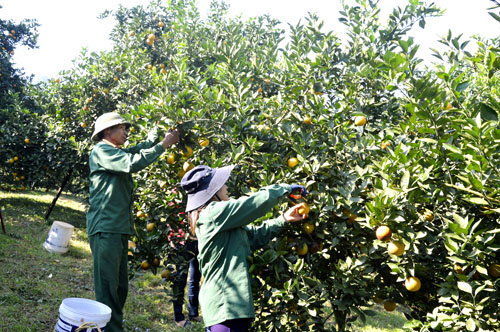
(HBO) - Cao Phong oranges in the northern mountainous province of Hoa Binh have won the trust of consumers nationwide thanks to the locality’s efforts to protect the Cao Phong orange brand name by ensuring product quality.
100 percent of
Cao Phong oranges are safe
Statistics
released by the Cao Phong district agriculture and rural department office show
that as of February 2017, the locality has about
2,080 ha of citrus trees,
of which
417 haare mandarin;
1,367 haare orange and
296 haare pomelo. The total area of small trees is about
1,178 ha while mature
trees account for some
900 ha.
In 2016, Cao Phong harvested more than 23,000 tonnes of citrus fruits which
were sold at an average price of 25,000-35,000 VND per kg.

Producing
organic oranges to meet consumers’ demands is the main plan in Cao Phong.
Photo: Farmers in Cao Phong town harvest oranges in the 2016-2017 crop.
Oranges and mandarins in Cao Phong are
harvested in different periods, from August to May of the next year. According
to Bui Van Dong, deputy head of the Cao Phong district agriculture and rural
development office, the consumption of Cao Phong oranges depends on the free
market, through private traders and wholesale markets. However, the consumption
market has been expanded as a result of the district’s communications campaigns
aiming to encourage local farmers to produce safe products. To prepare for the
second Cao Phong orange festival in November 2016, the district People’s
Committee worked with the Vietnam Certification Centre (Quacert) under the
Directorate for Standards, Metrology and Quality, Ministry of Science and
Technology to take random samples of oranges from stores in the district to
assess their quality. All the samples satisfied safety standards.
Changing ideas
about organic orange production from the smallest deeds
This is the main
target set by Cao Phong authorities and farmers. Bui Van Dong said that
acknowledging the increasing demand for organic oranges, in 2014, the district
People’s Committee teamed up with
Quacert to plant oranges following VietGap standards. At first, only 15
households in the district joined the programme with a total area of
49.8 ha. The figure
increased to 120 households at the end of February 2017 with about
142 ha and an output of
3,000 tonnes. The programme was implemented in Thu Phong, Bac Phong, Tan Phong,
Yen Lap, Nam Phong and Dung Phong communes.
According to Bui
Van Dong, the programme has attracted many households although it requires them
to follow up to 69 criteria. Apart from the 120 households, the district has
called on more households to participate in the programme in 2017, aiming to
have half of its orange areas at VietGap standards. The move shows that the
district is striving to protect its orange brand name by ensuring product
quality. Conforming to VietGap standards has helped local households raise the
competitiveness of their products to access strict markets.
Ta Dinh Thao, a
farmer in 5B zone, Cao Phong town, said joining the VietGap practice, they
ensure strict requirements regarding fertilisers and pesticides. Farmers have
to undergo compulsory training courses on production which is recorded in
detail everyday. For example, they used to fertilise orange trees without
composting. Now, it is compulsory to rot
manure for a period of time.
Bui Van Dong
said the Cao Phong district agriculture and rural development office has
reinforced inspections over orange production and following VietGap. The office
has asked agencies to punish violations of regulations regarding the amount of
heavy metals, pesticides and microorganisms in products to provide organic
fruit for consumers./.
Manh Hung
Since the beginning of this year, under the direction of the Department of Agriculture and Environment, the Sub-Department of Agricultural, Forestry, and Fishery Product Quality Management has strengthened the integration of the professional activities to promote and guide the organizations and individuals in the production and trading of agricultural, forestry, and fishery products to comply with the legal regulations regarding the use of chemicals, pesticides and veterinary medicines in crop cultivation, livestock farming and aquaculture. They also provide guidance to processing and manufacturing establishments on keeping the records to trace the product origins and using food additives from the approved list according to the regulations.
Hoa Binh province saw a significant rise in state budget revenue in the first two months of 2025, heard a meeting chaired by Vice Chairman of the provincial People’s Committee Quach Tat Liem.
Ha Thi Ha Chi, a 26-year-old graduate in law, has taken an unconventional path by returning to her hometown in Mai Chau district to establish the Tong Dau Cooperative, creating stable jobs for local women and bringing Thai ethnic brocade weaving to the global market.
As the Lunar New Year 2025 approached, pork prices surged, creating a profitable season for farmers in Tan Vinh commune, Luong Son district. Taking advantage of the rising demand, Can Minh Son, a farmer from Coi hamlet, sold over 30 pigs at 69,000 VND/kg, each weighing more than 100 kg. After deducting expenses, his family earned a profit of over 50 million VND.
alternate member of the Central Party Committee, Secretary of the Hoa Binh provincial Party Committee Nguyen Phi Long on March 5 had a working session with Yan Jiehe, Founder and Chairman of the China Pacific Construction Group, one of China's largest private corporations in the field of transport infrastructure. Deputy Secretary of the provincial Party Committee, Chairman of the provincial People's Committee Bui Duc Hinh and leaders of provincial departments and sectors also attended the working session.
The electronic printed circuit board (PCB) manufacturing and processing plant of Japan’s Meiko Group, located at Da River Left Bank Industrial Park in Hoa Binh city with a total investment of over 200 million USD, is expected to create thousands of jobs and make a significant contribution to the local budget.



